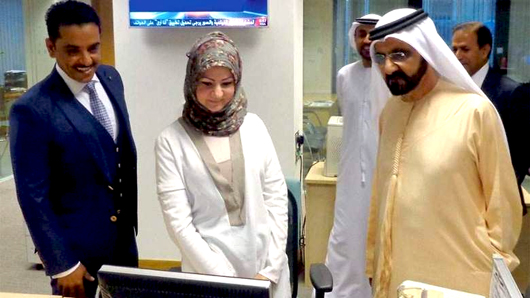Dubai, Sep 1: His Highness Shaikh Mohammed bin Rashid Al Maktoum, Vice-President and Prime Minister of the UAE and Ruler of Dubai acknowledged the close bilateral relations between the UAE and Saudi Arabia during his visit to the headquarters of Asharq Al Awsat newspaper in London.
Shaikh Mohammed stressed on the UAE's appreciation for Saudi Arabia's role in establishing stability and security in the region and affirmed the importance of Saudi Arabia's role under the wise leadership of King Salman bin Abdulaziz Al Saud, Custodian of the Two Holy Mosques. Shaikh Mohammed expressed his belief that Saudi Arabia will play a pivotal role in leading the region to peace and stability.
Editor in Chief of Asharq Al Awsat, Salman Aldossary, and senior executives received Shaikh Mohammed at the newspaper's headquarters. As one of the Arab world's most influential leaders and a global patron of media and journalism, the newspaper's management and staff welcomed him.
Shaikh Mohammed toured the newspaper's offices and was briefed by Aldossary on work processes, strategies and editorial policies. Shaikh Mohammed also met the newspaper's Assistant Editors-in-Chief Aidroos Abdulaziz and Zaid bin Kami, and conversed with the newspaper's journalists and editors.






Comments
Hello There. I found your blog using msn. This is an extremely well written article.
I'll be sure to bookmark it and come back to read more of your useful information. Thanks for the post.
I will definitely comeback.
Stop by my web blog ... piano 88 key keyboard, Carmelo: http://www.exceden.net/comment/html/index.php?page=1&id=53421,
My relatives always say that I am wasting my time here at
web, except I know I am getting knowledge all the time
by reading thes good posts.
Stop by my page :: digital piano keys: http://foro.floressoft.com/entry.php/691-Read-This-Report-Expert-The-Ma…
Everyone loves what you guys are usually up too.
This type of clever work and coverage! Keep up the superb works
guys I've you guys to my own blogroll.
my web page ... best
digital piano reviews: http://www.jingking.com/comment/html/index.php?page=1&id=28777
Thanks for the auspicious writeup. It in fact used to be a entertainment account it.
Glance complex to far added agreeable from you! By the way,
how can we be in contact?
my website :: best music keyboard reviews (Elisabeth: http://www.inthevendee.com/classifieds/user/profile/1354)
Thanks for the auspicious writeup. It if truth be told used to be a entertainment account it.
Glance advanced to more introduced agreeable from you!
By the way, how can we keep in touch?
Feel free to surf to my site best used digital piano - mc.haohong.cn: http://mc.haohong.cn/comment/html/index.php?page=1&id=5156 -
Wonderful post however , I was wanting to know if you could write a litte
more on this topic? I'd be very grateful if you could elaborate
a little bit further. Kudos!
Feel free to visit my weblog; best buy digital pianos: http://recyclingsurplus.com/?option=com_k2&view=itemlist&task=user&id=6…
Wow, that's what I was searching for, what a stuff!
existing here at this web site, thanks admin of this site.
Feel free to visit my homepage :: best digital
pianos under 2000: http://www.exceden.net/comment/html/index.php?page=1&id=53421
I got this web page from my friend who told me concerning this web site and at the moment this time I am browsing this site and reading very informative content at
this time.
Look into my homepage; best digital piano weighted keys: http://www.lhshyxx.com/comment/html//index.php?page=1&id=90736
Thanks a lot for sharing this with all folks you really
realize what you are speaking approximately! Bookmarked.
Kindly additionally consult with my site =). We will have
a hyperlink exchange agreement between us
my website - pianos at best buy (Launa: http://trac.parrot.org/languages/ticket/82869)
Pretty section of content. I just stumbled upon your website and in accession capital to assert that I
acquire actually enjoyed account your blog posts. Anyway I will be subscribing to your augment and even I achievement
you access consistently fast.
Also visit my web site ... which digital piano
is the best: http://trac.parrot.org/languages/ticket/82869
Wow, incredible blog layout! How long have you been blogging for?
you make blogging look easy. The overall look of your site is fantastic, let alone the
content!
Also visit my web site: best weighted keyboards: http://www.numwan.com/shopping/author/laylamagana/
Hi, after reading this amazing article i am also glad to
share my know-how here with colleagues.
My weblog digital pianos best (http://www.keralafilm.com/?option=com_k2&view=itemlist&task=user&id=867…: http://www.keralafilm.com/?option=com_k2&view=itemlist&task=user&id=867…)
I'm really loving the theme/design of your weblog. Do you ever run into any browser compatibility issues?
A handful of my blog audience have complained about my website not working correctly in Explorer but looks great in Opera.
Do you have any advice to help fix this issue?
Look into my blog casio digital
piano review: http://www.gsufans.com/tsc/member.php?u=209822-IsmaelGranger96
Hi there, just wanted to mention, I loved this post. It
was helpful. Keep on posting!
Feel free to surf to my homepage: keyboards
for beginning piano players: http://Www.Gsufans.com/tsc/member.php?u=209822-IsmaelGranger96
Add new comment